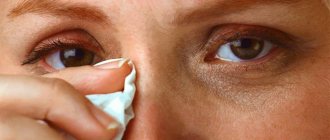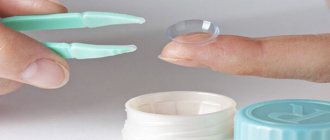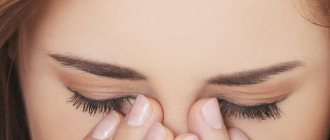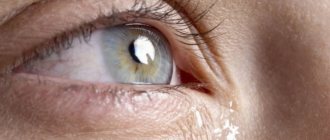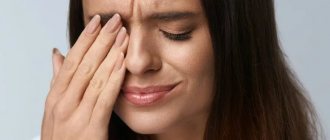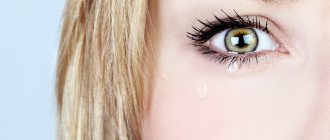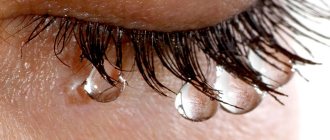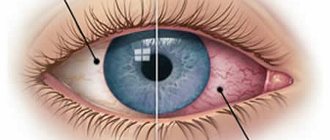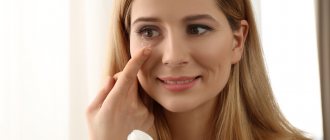Causes
The causes of lacrimation and runny nose may be associated with bacterial or viral infections, allergic reactions, vasomotor rhinitis, dry indoor air, mechanical irritation of the nasopharynx with dust, chemical spray or aerosol. Often such symptoms are provoked by rhinitis, sinusitis, frontal sinusitis, conjunctivitis, sinusitis, influenza, ARVI, neoplasms in the nasal passages. To find out the exact cause of the disorder, it is recommended to undergo a comprehensive diagnosis.
Rhinitis
Rhinitis is an inflammatory process that affects the nasal mucosa. Manifests itself in the form of the following symptoms:
- hyperemia of the mucous membranes
- moderate or severe swelling
- difficulty breathing
- copious mucus discharge from the nasal cavity
- itching, tickling and scratching in the nose
- impaired sense of smell
With allergic rhinitis, there are complaints of frequent sneezing and mucous discharge from the nasal cavity. Watery eyes increase, the eyelids itch, the voice becomes hoarse, and a skin rash appears. General health also worsens: complaints of headache, weakness, and decreased performance appear. The following substances can be allergens:
- plant pollen
- pet hair
- detergents
- dust
- mold
Allergic rhinitis can be seasonal or year-round. To solve the problem, you should look for the source of the allergy, restore the normal functioning of the liver, and use sorbents.
Sinusitis
Sinusitis is an infectious and inflammatory process that affects the mucous membranes of the paranasal sinuses. Can be triggered by viruses, fungi, bacteria, allergens.
General symptoms characterizing sinusitis:
- heat
- feeling of pain in the paranasal sinuses
- difficulty breathing through the nose
- serous and purulent nasal discharge
- profuse lacrimation
Sinusitis often occurs in people with deformed intranasal structures: deviated nasal septum, hypertrophic rhinitis, abnormalities in the structure of the nasal cavity. Patients with viral infections are at risk. Pathogenic microorganisms lead to inflammation of the mucous membrane of the paranasal sinuses, which causes swelling, lacrimation, and runny nose.
Conjunctivitis
Conjunctivitis is an inflammatory disease that affects the mucous membrane of the eyelids and sclera. Depending on the form of the disease, the patient may have complaints of increased lacrimation, hyperemia, redness, and itching of the visual organs. The disorder is often accompanied by a runny nose. Reasons that can cause such a disease: exposure to bacteria, viruses, fungi, chemical and physical irritants.
Sinusitis
Sinusitis is an inflammation that affects the maxillary (maxillary) sinuses. There are complaints of difficulty in nasal breathing, runny nose, lacrimation, discharge of pus and mucus from the nose. The progression of the pathology leads to pain in the bridge of the nose, swelling of the cheeks and eyelids, and increased body temperature.
Frontit
Frontitis is an inflammatory process that affects the mucous membrane of the frontal sinuses. Accompanied by severe pain in the eyebrow area, lacrimation, purulent or mucous discharge, general intoxication, and impaired sense of smell. The main causes of the disease: traumatic lesions, upper respiratory tract diseases, immunodeficiency.
Sphenoiditis
Sphenoiditis is a pathology of inflammatory origin that affects the mucous membranes of the sphenoid sinuses. Patients complain of headache, purulent discharge from the nasal passages, runny nose, and lacrimation. The temperature rises, the functioning of the visual organs is disrupted.
Flu and acute respiratory infections
Influenza and acute respiratory infections are accompanied by the penetration of infectious pathogens into the respiratory system. The body reacts with a runny nose, lacrimation, increased body temperature, chills, intoxication, and deterioration in physical and psychological well-being. Such conditions must be clearly differentiated and differential diagnostics carried out. In case of excessive lacrimation and runny nose, keep to bed and drink, ensure sufficient intake of zinc and ascorbic acid.
Rhinoliths
Rhinolith is a calculus (stone) that forms in the nasal cavity. Occurs in people with mucous and mineral deposits in the sinuses. It manifests itself as nasal congestion, runny nose, lacrimation, bloody or purulent nasal discharge, and headache. Nasal stones are most often detected in preschool children. The main cause of the disorder is the prolonged presence of foreign bodies in the nasal sinuses.
Frontit
One of the types of sinusitis, when the course of inflammatory processes moves to the sinuses of the forehead. Most often, the disease occurs after a cold, the treatment of which was stopped too early, or it is a complication of other infections, or decreased immunity.
- Symptoms.
The main ones are the following:
- the general condition worsens, a person quickly experiences lethargy, fatigue, and malaise;
- body temperature rises to 380C (fever);
- blocked nasal passages;
- the head hurts in the forehead, if you bend forward, it can radiate to the eye;
- loss of appetite;
- tearfulness and fear of light appear.
- Treatment.
It is important to know in advance that if you do not start following the doctor’s prescriptions on time, there is a high risk of serious complications, these include abscesses in the brain and optic membrane. At the same time, it is not possible to cope with the problem without emergency assistance from specialists.
In some cases, it is necessary to resort to surgery to remove pus, when a small incision is made in the forehead. Upon completion, they undergo a medication course, taking:
- antibiotics for 5-10 days, in full accordance with the severity of the disease;
- antipyretics, provided the temperature rises to 38.50C;
- vasoconstrictor drugs, but not more than five days, to avoid addiction;
- homeopathic, to relieve swelling, congestion, strengthen the immune system, restore sleep;
- mucolytic, intended for liquefaction, followed by rapid removal of sputum;
- anti-inflammatory;
- the nose is washed with a solution that includes sea salt;
- physiotherapeutic procedures.
Possible complications
The lack of timely therapy leads to the transformation of an acute pathological process into a chronic one, which in turn is fraught with serious complications: negative effects on the respiratory system and cardiovascular system. For example, with the development of rhinitis, the pathological process can spread to other parts of the respiratory system and cause the following symptoms:
- sinusitis
- otitis
- pharyngitis
- tracheitis
- bronchitis
- pneumonia
- inflammation of the pharyngeal tonsils, adenoids
- chronic tonsillitis
- eustachitis
In order to prevent shortness of breath, disruption of the functioning of the heart and blood vessels, at the first signs of a disorder, it is recommended to refrain from self-medication and seek qualified help.
Sphenoiditis
Damage to the sphenoid sinuses is one of the rarest complications, but the sensations are much more unpleasant.
- Symptoms.
It is distinguished by more strong manifestations, such as:
- pain localized in the back of the head, forehead, crown, ear, literally “bites” into the hemispheres of the brain;
- nasal passages are constantly blocked;
- purulent discharge;
- no sense of smell;
- the temperature rises;
- dizziness;
- seeing double;
- saliva is viscous;
- may chill, feel sick, even vomiting.
Diagnostics
To find out the exact causes of lacrimation and runny nose, you need to consult a doctor and undergo a comprehensive examination. A condition requires special attention when symptoms do not go away for 4-7 days and they are accompanied by accompanying symptoms in the form of increased body temperature, headache, hearing impairment, and purulent nasal discharge.
Depending on the general clinical picture, concomitant complaints and diseases, a comprehensive diagnosis is prescribed:
- general blood analysis
- rhinoscopy
- smear with bacterial culture to determine the causative agent of the disease and determine sensitivity to antibiotics
- radiography
- allergy tests
- Magnetic resonance imaging
For example, to identify sinusitis, ultrasound diagnostics, magnetic resonance imaging and computed tomography are recommended. Depending on the results obtained, the doctor selects the appropriate treatment regimen.
If your left eye is watering
The left side of the body has always been shrouded in negative signs. In the case of the eyes, this belief also works. If your left eye is watering, you should prepare for trouble. You may expect quarrels in the family, not very pleasant meetings with old enemies, visits from unwanted guests, gossip or intrigue.
If you don’t like this forecast, don’t be upset. There is also a positive interpretation: the left eye may become watery if a person will soon experience financial success, for example, a bonus, winning the lottery or receiving an inheritance. Which option you prefer is up to you. Usually what you wish for most and think about a lot comes true. So think positive.
Treatment
To achieve the best therapeutic result, it is necessary to treat the problem comprehensively. Using nasal drops and sprays may not be enough. Such drugs remove symptoms, but do not affect the cause of the disorder. The doctor recommends using conservative methods:
- drug therapy with drugs for local and systemic effects
- physiotherapy
- therapeutic rinsing
- puncture, drainage
If conservative methods are ineffective, radical therapy is used. Neoplasms (for example, polyps) also require surgical removal followed by anti-relapse therapy.
The general scheme of drug therapy includes the use of the following groups of drugs:
- Vasoconstrictors in the form of drops and sprays (Naphthyzin, Farmazolin, Xylen, Nazol, Sanorin): act for 6-10 hours, facilitate nasal breathing, are not intended for long-term use.
- Nasal drops and sprays for rinsing the nose based on an isotonic solution of sea water (Dolphin, No-Sol, AquaMaris): wash the nasal sinuses, reduce the severity of the effects of bacterial infection, moisturize, protect the mucous membrane from drying out. Regular rinsing prevents the growth and reproduction of pathogenic microorganisms and removes allergens, microbes and waste products from the mucous membrane.
- Broad-spectrum antibiotics can be used only after determining the sensitivity of the pathogenic microorganism to the action of the active substance of the drug. The doctor may recommend the use of Sumamed, Amoxicillin, Macropen. Such drugs are presented in several dosage forms: tablets, capsules for internal administration, solution for intramuscular administration. The doctor selects the appropriate dosage form, depending on the degree of progression of the pathological process. Antibiotic therapy must be supplemented with probiotics: Linex, Bifidumbacterin, Hilak Forte.
- Antihistamines: reduce lacrimation, itching, redness, and improve overall well-being. Doctors use the following drugs in their treatment protocols: Claritin, Zodak, Diazolin, Loratadine, Desloratadine.
The doctor may also recommend the use of immunomodulators, antiviral drugs, supplementary support in the form of vitamins, microelements, and amino acids. At the first signs of a cold, it is recommended to use vitamin C in high dosages and zinc. In case of allergic manifestations, efforts are directed towards cleansing the liver and gastrointestinal tract.
The drugs described are not intended for self-medication and can only be used with prior agreement with a doctor. Independent selection of drugs may not provide the expected therapeutic result. The disease will progress, which is fraught with serious complications.
Traditional medicine is used as an addition to the basic treatment protocol, with prior agreement with the attending physician. For a runny nose and lacrimation, use the following remedies: camphor and menthol oil, Kalanchoe juice, wild rosemary root, tinctures of eucalyptus or calendula, freshly squeezed juices (carrots, beets, apples, celery), garlic or onion extracts that instill sleep. Herbal teas based on ginger root, cinnamon, cloves, and ant tree food have a beneficial effect on overall well-being. This tea restores the immune system, increases the body's protective properties, and accelerates the healing process.
How to treat
In a situation where fluid has been leaking from the eye for several weeks, it is necessary to seek medical help. The doctor will identify the causes of the pathology and select the most effective treatment. Tearfulness caused by a cold usually disappears on its own immediately after recovery. In case of allergic reactions of the organ of vision to irritants, it is necessary to combat the increased sensitivity of the body.
Medicines and vitamins
Increased lacrimation may be a manifestation of an allergic reaction, so treatment can be carried out using eye drops such as Opatanol. In addition, it is possible to achieve a positive effect with the help of Diazolin and Allergol tablets.
It is possible to cope with pain thanks to topical medications, and quite often patients are prescribed Teagel. Simultaneously with the use of the ointment, it is recommended to massage once a month for preventive purposes.
To treat narrowed tear ducts, the eye can be probed using special solutions. Typically, an antibacterial agent such as Furacilin is used for this purpose.
Prevention
To prevent lacrimation and runny nose, you must follow simple preventive recommendations. First of all, efforts are directed towards strengthening the immune system.
To do this you need:
- observe the work and rest schedule
- limit exposure to stress
- review your diet: remove refined foods, sugar, minimize dairy products, gluten, fried, fatty, overly salty, sour, peppered, smoked foods
- maintain a drinking regime (water with lemon): the optimal amount of liquid per day can be calculated using the formula 30 ml multiplied by body weight
- give up bad habits: smoking, drinking alcohol
- restore sleep and maintain its hygiene: go to bed no later than 23:00 in a dark room without light sources, at a cool temperature, limit the use of gadgets a few hours before bedtime
- ensure a sufficient supply of vital nutraceuticals: vitamin D, ascorbic acid, magnesium are used as a base; deficiency of other substances is determined by a biochemical blood test and must be replenished
- give preference to moderate physical activity: daily walking of at least 10,000 steps per day, swimming, yoga, Pilates, running, etc.
It is also recommended to undergo regular preventive examinations and do an annual health check (general and biochemical blood tests, ECG, fluorography, consultation with an otolaryngologist, endocrinologist, gynecologist). At the first manifestations of the disease, it is recommended to refrain from self-medication and consult a doctor.
During the cold season, it is recommended to minimize the use of public transport and staying in places with large crowds of people. If this is not possible, then use a protective gauze bandage on the face and regularly rinse the nasal passages with salt?
Sinusitis
In this case, the sinuses located in close proximity to the nasal passages are affected. It is generally accepted that the disease is caused by the following reasons:
- polyps (tumors);
- weak immunity;
- deviated septum;
- allergic manifestations.
- Symptoms.
It is strictly forbidden to start the disease, the more important it is to know about all the main indicators confirming the presence in the body:
- temperature rise to 380C, usually remains normal or varies in the range of 37.0 – 37.40; at the same time the heat is felt;
- runny nose, initially with copious discharge, subsequently the mucus thickens, acquiring a yellowish tint;
- olfactory functions decrease, burning sensation;
- it hurts to tilt your head;
- disturbance in the direction of deterioration of general well-being - increased urination, diarrhea, nausea.
Quite often, the ear may still be clogged, which is due to the anatomical features of the location of the sinuses. Increasing pain indicates that frontal sinusitis has “joined” the existing problem.
- Treatment.
It is important to begin following the doctor’s recommendations as quickly as possible, which will avoid the onset of a chronic form. This circumstance is especially important if the patient is pregnant. There is also a periodic exacerbation of the disease, which will help to cope with:
- puncture or puncture, followed by pumping out purulent accumulations;
- antibiotics, the choice of which is determined by a specialist;
- the nasal passages are washed with saline solutions;
- inhalations, to which essential oils, medicinal herbs, and saline are added to enhance the effect;
- hormonal, immunostimulating agents with anti-inflammatory properties;
- vasoconstrictor drugs.
Interpretation by days of the week
- Monday is a day of sadness. The received signs indicate imminent sadness, melancholy, and despondency.
- Tuesday is for acquaintances and meetings. They can happen at work or on the personal front.
- Wednesday - a visit from blood relatives is just around the corner. The visit will be expected and will not come as a surprise, but as a result, both great joy and disappointment are possible.
- Thursday - for conversations with friends or good buddies.
- Friday is a day of disappointment. The dreams that I wanted to make come true, unfortunately, will not come true. Perhaps for the better.
- Saturday is neutral time. Even unexpected tears will not cause much trouble.
- On Sunday, your plans will come true. But only the side will say what fulfilled desires will bring: the left - disappointment, the right - good luck.
Tear duct stenosis
In the case when a child’s eye constantly waters, and standard medications for lacrimation do not help or only help for a short time, lacrimation has a physiological cause - blockage of the nasolacrimal duct. As a rule, this is detected during a routine examination by an ophthalmologist.
In such cases, the doctor usually prescribes a massage of the tear ducts, which the mother can perform for the child on her own. The purpose of the massage is to increase the permeability of the lacrimal ducts and stimulate the outflow of tears from the lacrimal sacs.
If, over time, the massage does not bring the desired effect, the doctor may prescribe lavage (probing) of the tear ducts. The smaller the child, the easier he will tolerate this intervention, so it is recommended to perform probing before the baby is six months old.
Why do hot tears appear?
The feeling of not just wetness on the cheeks, but burning drops is a sign with ancient roots. According to an old belief, if hot tears flow, you should stop and listen to your inner sensations.
The reason is severe emotional shock. But she's not the only one. It happens that a person simply does not want to believe that he was hurt. But the soul knows. Analyzing your own feelings and sensations will help you understand yourself, calm down and move on.
A great solution is to spend your free time with friends or do something you love.
Colds and flu
They are most often seasonal in nature and must be eliminated by conducting a full course aimed not only at getting rid of negative consequences, but also at preventing relapse.
- Symptoms.
The main reaction from the body to the appearance of viruses and bacteria is a change in temperature balance, swelling of the mucous membranes, enlarged tonsils, headache, muscle pain, as well as pain when swallowing, general malaise, chills, sweating, shortness of breath, and rapid pulse.
Even a simple respiratory infection cannot be neglected or left unattended, especially for pregnant women, which will avoid more serious complications - pneumonia, meningitis.
- Treatment.
The first thing you need to do, in addition to visiting the doctor, is to stay in bed, which will allow you to quickly forget about the trouble. The specialist, after studying the results of the analysis, will make a diagnosis and prescribe a course of rehabilitation appropriate to the disease. You should immediately say a firm “no” to self-medication.
- Painkillers will help get rid of headaches.
- If nasal congestion is not of an allergic nature, you need to use isotonic solutions for rinsing, followed by instillation of vasoconstrictor drugs, no more than five days for each, which will avoid drug-induced edema.
- Antihistamines will relieve allergies.
- When a sore throat radiates to the head, you should often gargle with anti-inflammatory solutions and use sprays and dissolving tablets.
- Antipyretic.
According to experts, it is homeopathy that can cure allergies; folk remedies are also used, especially when treating a child’s rhinitis, a sharp exacerbation of a cold.
So, if the following symptoms are noted: back pain, fever or headache, myalgia of the neck, lower back, every movement is felt in the area (point) of the spine (right side, left), low level of resistance - it is important to correctly complete the course of treatment. It is completely clear why this is necessary - to prevent a relapse, which happens quite often in a severe form and can unexpectedly strike the most unprotected (weakened) places.
Author of the article: Neurologist Konstantin Olegovich Makheev.
